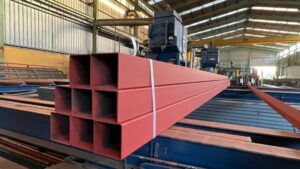Written by Jeremy Zabatta

In financial difficulty since the bankruptcy of Greensill, the main creditor of its parent company GFG Alliance, Liberty Steel will have to quickly find solutions to restore production rates in Dudelange and to pay all employees. Photo: Guy Wolff/Maison Moderne
Liberty Steel will not be able to resort to short-time working next April after an agreement with trade unions regarding a plan to maintain employment in Dudelange fell through.
Luxembourg’s economic committee refused the steelmaker’s application for short-time employment. In financial difficulty since the bankruptcy of Greensill, the main creditor of its parent company GFG Alliance, Liberty Steel will have to quickly find solutions to restore production rates in Dudelange and to pay all employees.
The economy ministry confirmed that the steelmaker did not succeed in agreeing a job maintenance plan with the trade unions. “In the absence of sufficient financial commitments from Liberty Steel, the negotiations between the unions, staff representatives and management on the conclusion of an employment maintenance plan for the Liberty Steel plant in Dudelange have reached an impasse. At its meeting on 21 March 2022, the economic committee therefore refused Liberty Steel’s request for partial unemployment for the month of April”, said the economy ministry.
The trade unions also deplored the failure of the negotiations on a job maintenance plan that began last December and that aimed to give the steelmaker time to restructure. “Today, Liberty Steel has a structural problem. And to be able to take advantage of partial unemployment, you have to have a plan to maintain employment. A project that did not come to a positive conclusion because of Liberty Steel, because they cannot give sufficient guarantees and we were obliged to refuse the project put forward by the management of Liberty Steel in Dudelange”, said Robert Fornieri, deputy secretary general of the LCGB.
Towards liquidation in Liège
In concrete terms, from April onwards, Liberty Steel will have to pay all of its workers’ wages. According to trade union estimates, short-time working at the Dudelange site represented around 15% of the wage bill for a workforce of some 250 employees.
The steelmaker has been experiencing liquidity problems for several weeks, which prevents it from obtaining enough raw materials to keep its Luxembourg site running at full capacity. The site is also being supplied by the steelmaker’s two sites in Liège, where Liberty Steel is also experiencing financial difficulties. After submitting a financial restructuring plan to Belgian courts, the steelmaker has not managed to honour its commitments and the Belgian courts will give their verdict at the end of the month on a possible liquidation.
A serious solution with an industrial buyer
The Belgian court’s decision will not have any judicial effect on the Luxembourg site but from an industrial point of view, the loss of the Liège sites would be a huge blow to the operation in Dudelange.
Workers are holding out some hope for a solution with the arrival of an industrial buyer, provided that Liberty Steel finally agrees to sell. Behind the scenes, the unions are working to try to find such a buyer and they insist that “a serious solution exists”.
“We can’t reveal everything, but we are indeed working on an alternative solution with a partner. But Liberty Steel still has to be a seller. But we are afraid that Liberty Steel will be able to find the money to pay the employees of a plant that is almost at a standstill,” said Fornieri. He is also wary that the steelmaker could try to sell to the highest bidder and not to the most competent one from an industrial point of view.
Finally, the labour and economy ministries are also talking about “serious avenues” to “continue to work actively together with trade unions LCGB and OGBL to maintain steel manufacturing activity and preserve jobs at the Liberty Steel site in Luxembourg, taking into consideration all possible options, including a takeover by another industrial player”.
Less short-time working in April
At the beginning of the week, the economic committee issued a favourable ruling on 708 requests after analysing the 766 dossiers submitted by companies asking for partial unemployment for the month of April. This is 332 fewer than the previous month.
Out of all the accepted applications 640 are related to covid, 61 to manufacturing shortages, five to flooding and two to economic dependence. They affect a total of 14,860 employees, compared to 12,119 the previous month. There has been an increase in claims from large companies in the manufacturing sector as a result of the war in Ukraine.






